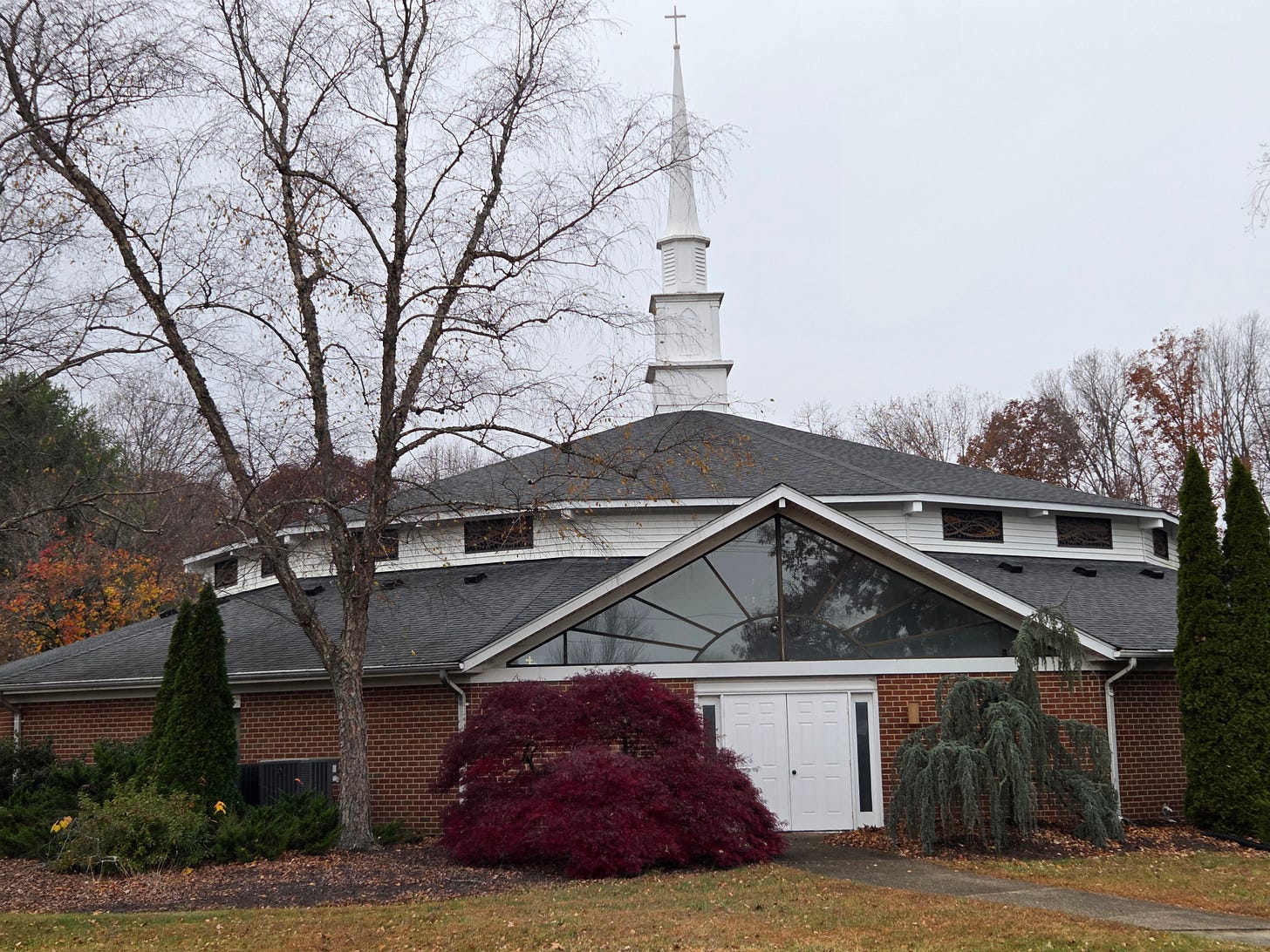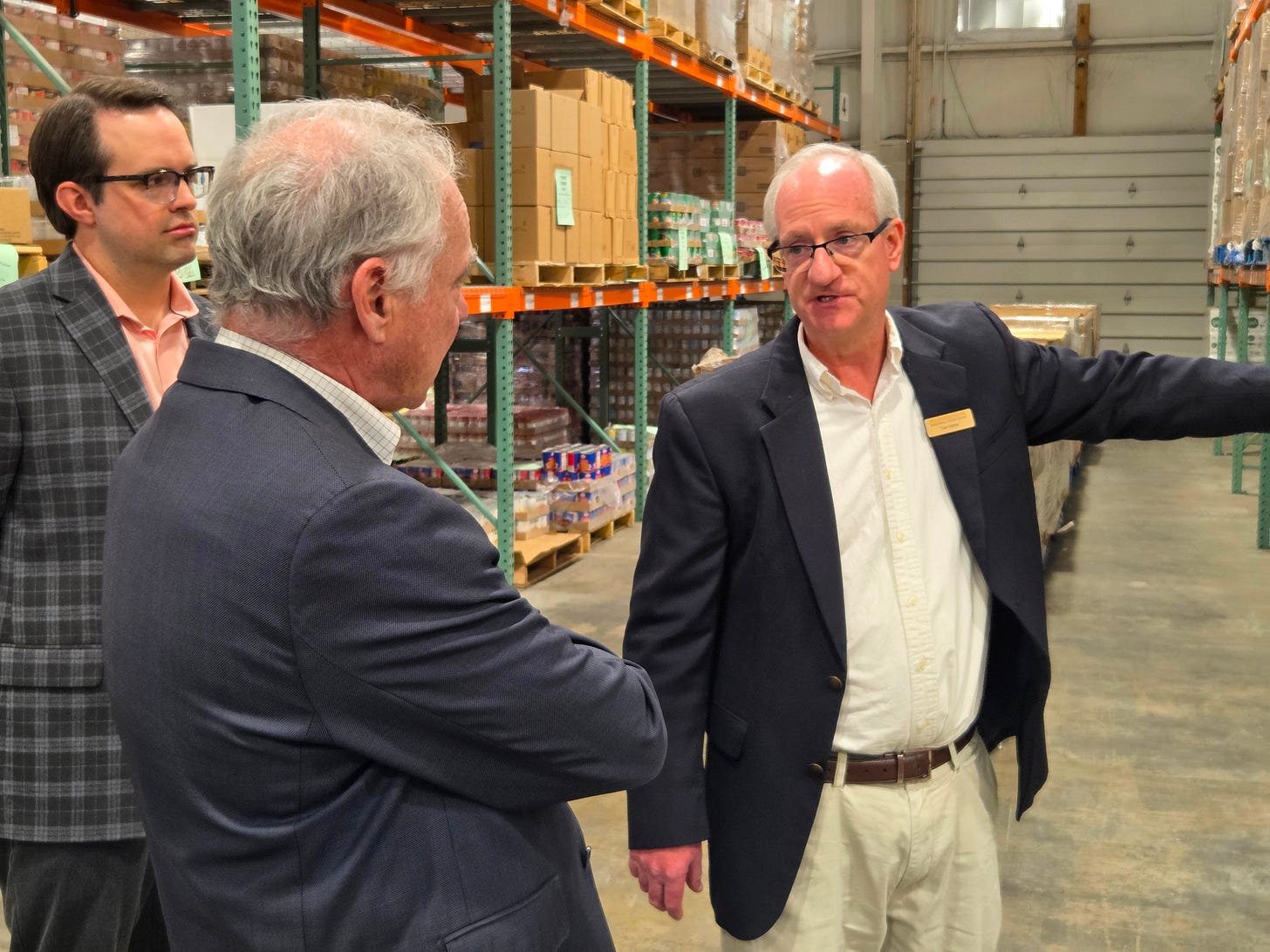Needy Served When Organizations Think with 'Communal Mindset'
The Fredericksburg Regional Food Bank reaches more than 50,000 people a year with substantial assistance from its partners agencies.
By Martin Davis
EDITOR-IN-CHIEF
Email Martin

Like many people in faith-based communities, Tracey Bailey of Chancellorsville Baptist Church wanted to help his neighbor.
“Our church had a very small food ministry,” he told the Advance, that served between eight and 15 people weekly. The program was far from extravagant.
On Tuesdays, the church would take in donations from Panera, and on Wednesday volunteers would distribute the bread and pastries the store provided with canned beans, dry pasta, and some other shelf-stable items that church members would donate.
The donations were “helpful,” Bailey said. But the impact was limited. That was OK for the church, but in a region rapidly growing, it was increasingly apparent that many more people were in need of assistance.
Another church member who had been helping hungry people independent of the church then approached Chancellor Baptist about doing a distribution on Saturdays. She had fresh fruits and vegetables that she had pulled together through her network — she just needed a place to distribute everything.
“This woman had some food access and a network of people she was serving, she just needed a mechanism for doing it,” Bailey said.
As demand for the church’s services grew, it realized that managing the program required support. It turned to the Fredericksburg Regional Food Bank.
Today, the church is able to serve at least 300 families a week, something that Bailey says would not be possible without the Food Bank.
It is critical in helping Chancellor secure the food that it needs, but the Food Bank’s efforts go beyond distribution. “The Food Bank provides us with all the safety guidelines to follow,” Bailey says, “as well as the training and badges” volunteers need to ensure food delivery meets quality standards and that volunteers over the weekends can themselves go to stores to pick up food they are unable to use. “This is food that has just hit its best-by or is just past its best-by date.”
One of Many Partners

The growth in distribution capacity at Chancellor Baptist Church is not the result of a one-off arrangement with the Food Bank.
Rather, it grew slowly over time. For example, it didn’t go from 10 families served each week to 300 overnight when the Food Bank came onboard. The church has been providing food assistance to people in need for the better part of 25 years. Even before the partnership with Panera, the church would keep food on-hand for people who came to the door.
Just prior to COVID, the Food Bank approached Chancellor about becoming part of the federal TEFAP (The Emergency Food Assistance) program. This increased the amount of food the church was able to distribute significantly, and brought a significant jump in people served.
By the time that offer was made, however, the Food Bank and the Church had been working together of a number of years.
Collectively, there are more than 200 such relationships with organizations in Caroline County, the City of Fredericksburg, King George County, Locust Grove, Spotsylvania County, and Stafford County that partner with the Food Bank to distribute food directly into hard-to-reach areas.
These partnerships are what enabled the Food Bank last year to help 51,000 people receive healthy food.
“We’ve got to have strong agency partners to execute in the community,” Food Bank CEO Dan Maher told the Advance.
Each partnership, however, is sui generis, meaning the Food Bank works within the capacity limits an organization faces. It will work to grow an organization’s capacity only when that organization is ready and willing to do so.
“Not all partners are capable or willing,” Maher said, “to have maximum capacity because they can’t invest in it themselves or they don’t have the volunteer bandwidth. Where they can, we invest our resources there.”
Germanna Goes from Closet to Pantry
The food pantry at Germanna Community College, called “Bear Necessities,” is a partner agency with the Food Bank, but in ways that are quite different from Chancellor Baptist Church.
Lindsey Epperson told the Advance that Germanna opened its food pantry in 2017 in a closet. The school recognized it needed to do more to help students, so it started where it could.
“The Food Bank has played a critical role in evolving and growing us from a closet to the space we’re in now,” said Epperson, a food pantry specialist, from where the pantry “serves hundreds of students a month.” That’s up from the handful it was serving when it opened its doors.
“The Food Bank has been there at every stage of development,” Epperson said. But it hasn’t been pushy. “They’ve never asked us to be something we aren’t ready to do,” she said, “but they help us grow in a way that is organic.”
That growth has occurred in three phases.
FIRST – The Food Bank assisted Germanna when the pantry was small by helping it secure a steady stream of shelf-stable foods. This “set the groundwork for us doing something better,” Epperson said.
SECOND – Germanna was then selected by the Food Bank to be a Healthy Pantry Initiative pilot program. The HPI program focuses on educating people about healthy eating and creating access to healthier food options for them. When Germanna joined the program, Epperson said the Food Bank came alongside to help with infrastructure, food access, and funding. That allowed the pantry to build racks and secure baskets to display food, as well as educate people about food choices. Another piece of HPI has been the introduction of hydroponics. Epperson says that people can take herbs home in red Solo Cups they can then grow on their own.
THIRD – The Food bank invested in the school’s Locust Grove and Stafford campuses to help them grow as a part of HPI. That has been the catalyst for growing those places, and all of that has occurred within the past year.
The push for healthy eating is important across the Food Bank network, but it has been the driver for the program at Germanna.
Beyond simply providing the options, Germanna presses the educational component.
“Our shelves are broken up by type,” Epperson said, “with markers on the shelves [colored] green, yellow, red that allow people to make a decision about what is best in their diet.”
While Germanna doesn’t force people to follow the color-coded health guidelines they recommend, “people do tend to make better choices when they are informed,” Epperson said. “People start to ask questions about why things are on the shelves that they are on.”
The Food Bank’s influence at Germanna goes beyond direct assistance to agencies, however.
According to Epperson, “Virginia Community Food Connections also helps us get fresh produce every week from local farmers.” The connection to VCFC came about through Germanna’s connection to the Food Bank. “Without the Food Bank,” Epperson said, “it may have been harder to connect to VCFC.”
“A lot of people,” she continued, “may not realize the degree to which the Food Bank is a stellar cornerstone of our community. Fredericksburg is really rich in its food services and resourcing. There are a lot of community organizations that come together, and the Food Bank makes sure that those groups come together.”
Love Thy Neighbor
In King George County, the Love Thy Neighbor Program has become a key agency for the Food Bank. However, before that relationship was formed, Love Thy Neighbor had eight years under its belt serving the community.
The program was founded in 2012, and the partnership with the Food Bank developed in 2020 as a result of COVID, according to program Executive Director Miriam Niemi.
“We were only serving neighbors once a month and offering a meal,” she said. “COVID ended the face-to-face component and we were looking for ways” to continue to serve.
The big change in the Love Thy Neighbor program came in 2022 when it secured facility space in the basement of the old newspaper building in King George.
Whereas they had been getting one truckload of food to help feed neighbors, in 2022 they began getting two truckloads.
The program took another step forward earlier this year
“Eight months ago,” Niemi said, “we began offering visits to neighbors who needed a more relaxed setting. Older people who can’t get out at nights.”
In King George, transportation is a significant issue. Predominantly rural and agricultural, many of the people Love Thy Neighbor serves can’t easily get to a facility to receive food. So Love Thy Neighbor comes to them.
Then this summer, the program began receiving a third truckload. Now, it gets about 10,000 pounds of food from the Food Bank each week.
Now, Love Thy Neighbor is looking to extend its supply by possibly working with Dollar General stories to reclaim food they must pull from the shelves.
“The Fredericksburg Area Regional Food Bank is making those connections with corporate groups,” Niemi said.
The organization is also working to create a more formal structure. Niemi says they are hiring a full-time operations manager, and that they are receiving grants through the Mary Washington Foundation and the Community Foundation and King George which are significantly aiding their work.
Gaining space has helped Love Thy Neighbor grow its reach, but it still doesn’t have large amounts of storage space for food. “We value the partnership with the Food Bank,” she said. “We don’t have lots of storage, so receiving food several times a week is critical.”
Making It All Work
Every food pantry that partners with the Food Bank has its own challenges. Whether it’s space, volunteer capacity, transportation, funding, or storage, the Food Bank works to tailor its support to that agency.
“While we try to allocate funding to invest directly in our agencies,” Maher told the Advance, “that isn’t always possible. So we ask them to consider what they can do to build their own capacity.” At Chancellor Baptist, Germanna, and Love Thy Neighbor, each agency has learned to go beyond the Food Bank to grow its capacity.

Still, “when we do have resources during times like COVID, or the Shutdown,” Maher said, because “resources are flowing in, we try to invest in our partners.”
That capacity-building can be providing storage space, freezers, coolers, thermal blankets, even vehicles.
“There are certain things we need each agency to have,” Maher said. “The ability to control food temp, we’re going to make sure they have that. But when it comes to bigger and better, we try to incentivize that.”
Mishelle Krogstad has been responsible for managing the agency partners for 17 years. “Every agency is different,” she told the Advance. “It depends on the volunteers, space, how often they choose to serve the community, days and times that they’re open, the service area they want to work in.”
The Food Bank visits each agency once throughout the course of each year. When they show up, Krogstad says, they begin with “Do you have any questions for me?”
From there the Food Bank does a walk-through looking for things such as leaky ceilings that could negatively impact food safety.
“We’re not here to police,” says LaToya Brown, “We’re here to feed. … Yes, there are these guidelines. Yes, we need to monitor, but we don’t need to police.”
Brown is director of community partnerships at the Food Bank and says that she “prides herself on the relationships I have with my partners. Just keeping in close contact. Email, face-to-face, and visiting each site at least once a year.”
More Than Extending Reach
“Everybody has empathy for the people they’re serving,” Maher said, “but we want to broaden that empathy to the needs of the entire community.”
Empathy is usually what gets groups and organizations involved. At Chancellor and at Germanna, it was an awareness of immediate needs that motivated them to want to do more. And at Love Thy Neighbor, it was the pressures brought by COVID that motivated the organization to expand the impact they are having in King George.
Without the Food Bank, however, doing more would not have been possible.
“Without the Food Bank’s help,” Bailey of Chancellor Baptist Church told the Advance, “We could only help about one-third of the [hundreds of] families” the church is currently aiding.
“Every partner wants what is best for those that they serve,” said Maher, and that’s “honorable and noble. But being part of a network, we encourage people to think with a communal mindset.”
That communal mindset begins with a simple question — “Who is your neighbor?”
As the Food Bank shows, through a network, people can reach and work with far more neighbors than most know they have.
Local Obituaries
To view local obituaries or to send a note to family and loved ones, please visit the link that follows.
Support Award-winning, Locally Focused Journalism
The FXBG Advance cuts through the talking points to deliver both incisive and informative news about the issues, people, and organizations that daily affect your life. And we do it in a multi-partisan format that has no equal in this region. Over the past year, our reporting was:
First to break the story of Stafford Board of Supervisors dismissing a citizen library board member for “misconduct,” without informing the citizen or explaining what the person allegedly did wrong.
First to explain falling water levels in the Rappahannock Canal.
First to detail controversial traffic numbers submitted by Stafford staff on the Buc-ee’s project
Our media group also offers the most-extensive election coverage in the region and regular columnists like:
And our newsroom is led by the most-experienced and most-awarded journalists in the region — Adele Uphaus (Managing Editor and multiple VPA award-winner) and Martin Davis (Editor-in-Chief, 2022 Opinion Writer of the Year in Virginia and more than 25 years reporting from around the country and the world).
For just $8 a month, you can help support top-flight journalism that puts people over policies.
Your contributions 100% support our journalists.
Help us as we continue to grow!
This article is published under Creative Commons license CC BY-NC-ND. It can be distributed for noncommercial purposes and must include the following: “Published with permission by FXBG Advance.”














Thank you for covering this.